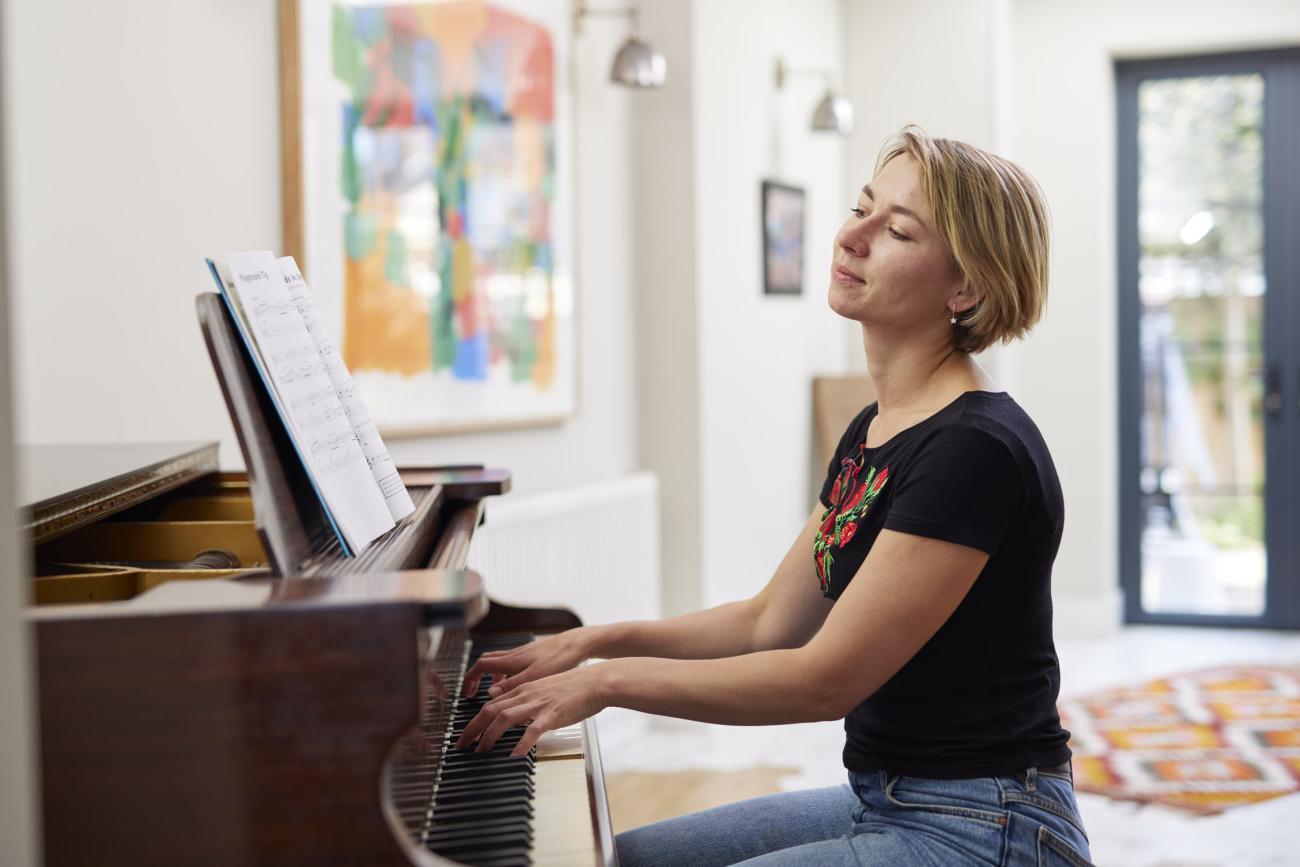Accompaniment
You must have accompaniment for all Performance Grade pieces or songs that are published with an accompaniment or duet part, unless the syllabus says otherwise.
For most Performance Grades you can choose from:
- live accompaniment
- recorded accompaniment
- a combination of the above
You can find more information about recorded accompaniment below.
We have different requirements for Drum Kit exams - you can find more information in the qualification specification (syllabus) on our Drum Kit page.
Choose a link below for detailed guidance on using recorded accompaniment in Performance Grades.
Choose the accompaniment option that works best for the candidate’s circumstances and choice of repertoire and that will help them to achieve the best musical outcome in their performance. The decision will be influenced by a number of things, such as the instrument, level of exam and style of music.
Think about which form of accompaniment to use for each piece, considering the marking criteria for the ‘pieces’ and how the accompaniment affects the ‘performance as a whole’.
Recorded accompaniments can suit some musical styles better than others. Music in a groove or with a constant pulse may be easier to perform with a recorded accompaniment than a piece with tempo changes or rubato.
Where there are tempo changes in pieces, careful and regular practice with a recording can help candidates to become familiar with them, but sometimes live accompaniment is a better option.
Examiners assess all Performance Grade exams in the same way using the same marking criteria. While the choice of accompaniment does not affect the way the exam is assessed, it may affect the candidate’s performance and therefore the marks they receive.
Think about the way a recorded accompaniment might affect the delivery of the overall performance, including the balance of sound. These are both assessed as part of the ‘performance as a whole’ and are the candidate’s responsibility.
Examiners cannot make any allowances for problems that arise from using recorded accompaniment.
The recording should be of good quality and:
- must be of the accompaniment only
- must not change the difficulty of the piece – for example, by including the candidate line within the accompaniment where it is not included in the published edition
- must match any syllabus requirements, such as those relating to repeats or cuts. This may make some commercially-available recordings unsuitable.
Many publications listed in our syllabus come with recorded accompaniments. However, we do not review or check these. Before choosing to use them, make sure they match our syllabus requirements for the piece and are suitable for the exam.
We provide recorded accompaniments for some instruments and pieces, including through our Practice Partner apps. However, candidates do not have to use ABRSM recorded accompaniments and they may not always be suitable for an exam.
Commercially-available recordings are likely to be in copyright and copying or editing a recording to make it suitable for an exam may be an infringement. We expect candidates to act within the copyright laws of their country and we may withhold an exam result if we have evidence that this is not the case.
Live accompaniment must be played on a piano or specific duet instrument. However, if suitable for the music, a recorded accompaniment can be synthesised or scored differently – such as an orchestral accompaniment for a concerto movement.
Think about the overall delivery of the performance. It may help if another person, such as the responsible adult, operates the audio-playback equipment. This is allowed and may be particularly helpful for changing tracks/CDs.
Test the balance of sound between the candidate and the accompaniment before recording. It is important that the candidate can hear the accompaniment while they are performing and that the examiner can hear both parts in appropriate balance.
Candidates should check their tuning against all the recorded accompaniments they are going to use. Tuning may vary between recordings and it’s helpful to identify and plan for these differences in advance.
If candidates are out-of-tune with their recorded accompaniment and do not adjust, this will be reflected in the marking.
In specially-created recordings it’s a good idea to include a tuning note from the piano or duet partner.
If the candidate’s part begins on the first beat of the bar, they are likely to need a count-in or an added introduction in the accompaniment. We accept both approaches with no effect on the marking. Added introductions should be short – no more than a few bars – and in keeping with the piece.
If candidates get out of time with their recorded accompaniment during the performance and are unable to get back in time, we recommend that they stop recording and start a new recording of the whole exam programme.
Playing out of time with a recorded accompaniment or having to re-start a piece will be reflected in the marking.
We continue to advocate for the use of live accompaniment in exams. Live interaction with another musician is important to the development of all-round musicianship and during an exam a skilled accompanist can be responsive and supportive in the way a recording can’t.
Where possible, we would encourage candidates opting for recorded accompaniment to use professional accompanists to create specially recorded accompaniments, instead of using commercial recordings or backing tracks.
We hope that by providing a recorded accompaniment option we are improving access to exams and encouraging more learners to progress. In the long term, this may lead to more musicians needing professional accompanists, whether for exams or other musical activities.
Examiners assess all Performance Grade exams in the same way, using the same marking criteria. The choice of accompaniment does not affect the way the exam is assessed but may affect the candidate’s performance and therefore the marks they receive. Individual circumstances will affect the musical outcome and this is something to think about when deciding what accompaniment to use.
Yes, although we would always encourage live accompaniment at higher grades where possible.
Performing with another musician allows for jointly made interpretive decisions and flexibility and spontaneity in performance, which are important in creating a successful and meaningful performance as well as for musical development. This is particularly the case for certain styles of repertoire and at higher levels.
However, we do believe in making music and exams as widely accessible as possible and finding a suitable and affordable accompanist can be a barrier for many people. So, in some cases a recorded accompaniment may be a better option for a candidate.

